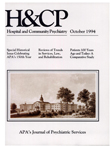Four Decades of Mental Health Trends: An Empirical Analysis of Hospital and Community Psychiatry
Abstract
Objective: The authors exam, ined important trends and developments within the mental health field since the 1960s as reflected in articles publisbed in Hospital and Community Psychiatry. Methods: A total of 798 articles were reviewed, representing all contributions to the journal in 1962, 1967, 1972, 1977, 1982, 1987, and 1992. Articles were classified into one of six categories, and empirical research articles were further classified by primary topic. in addition, all articles were indexed by primary setting (hospital, community, or both); academic credentials and gender of first author, andeconomic or public policy focus. Results: The number and percentage of empirical research articles increased over time, while articles describing programs and professional roles declined. Some changes were observed in the primary topics of empirical research. Other findings reflect a shift in the setting of articles from hospitals to the community and a growth in the percentage of women who were first authors and of authors with a Ph. D. degree. Conclusions: The documented growth of empirical research in psychiatry suggests a greater emphasis on methodological rigor in the design and implementation of mental health services. Moreover, increases noted in scholarly contributions by women and nonmedical professionals indicate a broadening of disciplinary perspective over time that is likely to strengthen psychiatric research and services.
Access content
To read the fulltext, please use one of the options below to sign in or purchase access.- Personal login
- Institutional Login
- Sign in via OpenAthens
- Register for access
-
Please login/register if you wish to pair your device and check access availability.
Not a subscriber?
PsychiatryOnline subscription options offer access to the DSM-5 library, books, journals, CME, and patient resources. This all-in-one virtual library provides psychiatrists and mental health professionals with key resources for diagnosis, treatment, research, and professional development.
Need more help? PsychiatryOnline Customer Service may be reached by emailing [email protected] or by calling 800-368-5777 (in the U.S.) or 703-907-7322 (outside the U.S.).



